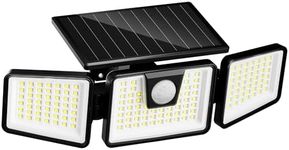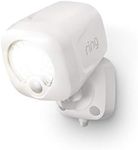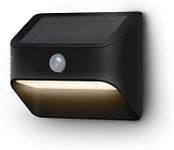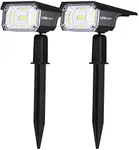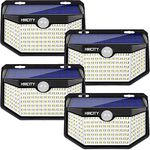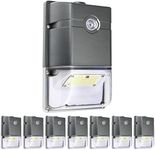Buying Guide for the Best Solar Security Lights
Solar security lights are a great way to enhance the safety and security of your property while being environmentally friendly. These lights harness solar energy during the day and use it to illuminate your surroundings at night. When choosing the right solar security lights, it's important to consider several key specifications to ensure they meet your needs and provide reliable performance.Brightness (Lumens)Brightness, measured in lumens, indicates how much light the solar security light emits. This is important because it determines how well the area will be illuminated. Lower lumens (around 100-300) are suitable for small areas or pathways, medium lumens (300-800) are ideal for larger areas like driveways or gardens, and high lumens (800+) are best for wide spaces or areas requiring intense illumination. Choose the brightness level based on the size of the area you need to light up and the level of security you desire.
Battery CapacityBattery capacity, usually measured in milliampere-hours (mAh), indicates how much energy the battery can store. This is crucial because it affects how long the light can operate during the night. Smaller capacities (1000-2000 mAh) may last for a few hours, medium capacities (2000-4000 mAh) can provide light throughout the night, and larger capacities (4000+ mAh) are ideal for extended illumination. Consider your location's average sunlight exposure and how long you need the light to stay on when choosing the battery capacity.
Solar Panel EfficiencySolar panel efficiency refers to how effectively the panel converts sunlight into electrical energy. Higher efficiency panels can generate more power even in less sunny conditions. Efficiency is typically expressed as a percentage, with higher percentages indicating better performance. Panels with 15-20% efficiency are standard, while those above 20% are considered high efficiency. If you live in an area with limited sunlight, opt for higher efficiency panels to ensure your lights stay charged.
Motion Sensor RangeThe motion sensor range determines how far away movement can be detected by the light. This is important for security purposes, as it affects how early the light will activate when someone approaches. Short ranges (up to 10 feet) are suitable for small areas, medium ranges (10-20 feet) work well for driveways and gardens, and long ranges (20+ feet) are ideal for larger properties. Choose a range that matches the size of the area you want to monitor and the level of security you need.
Weather ResistanceWeather resistance indicates how well the solar security light can withstand various weather conditions, such as rain, snow, and extreme temperatures. Look for lights with an IP rating, which measures protection against dust and water. An IP65 rating is standard for outdoor lights, providing good protection against rain and dust. If you live in an area with harsh weather, consider lights with higher ratings like IP66 or IP67 for better durability. Ensure the light can handle the typical weather conditions in your area.
Installation and AdjustabilityInstallation and adjustability refer to how easy it is to set up the light and adjust its position. Some lights come with adjustable mounts, allowing you to direct the light where it's needed most. Easy installation is important for convenience, especially if you're not experienced with DIY projects. Look for lights with clear instructions and adjustable features to ensure you can position them effectively for optimal coverage and security.


